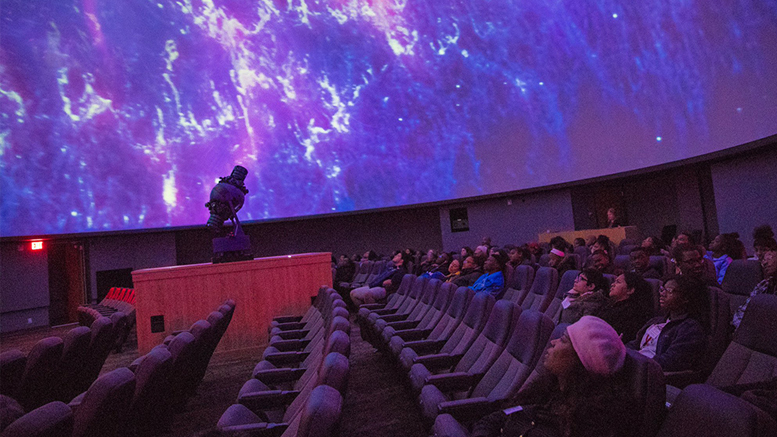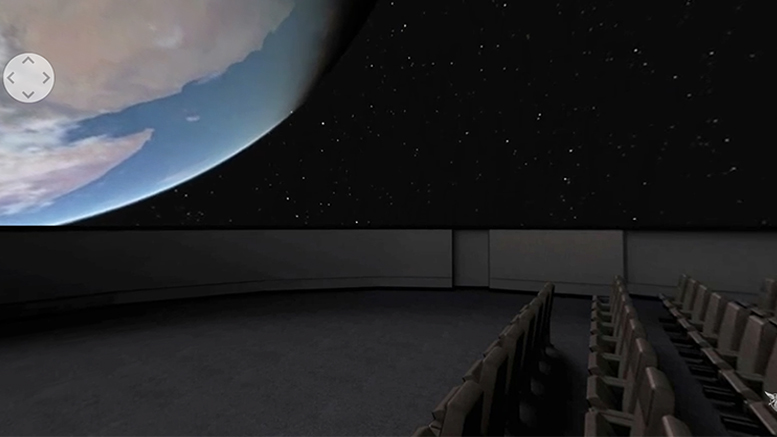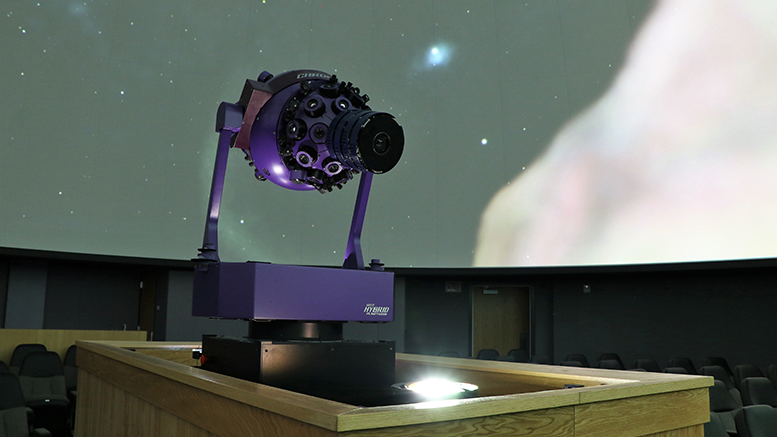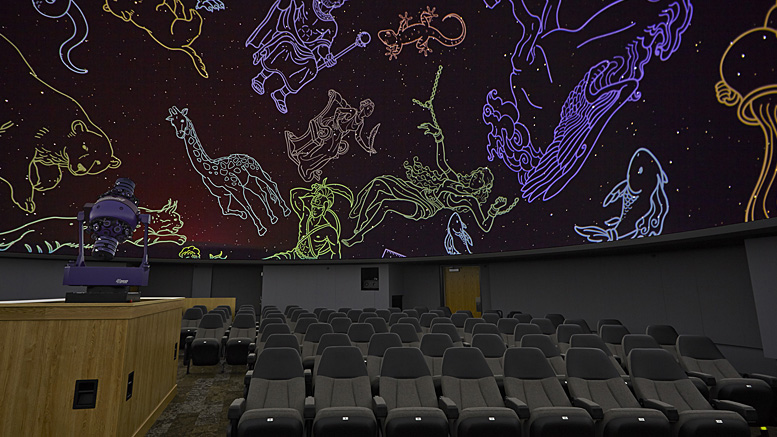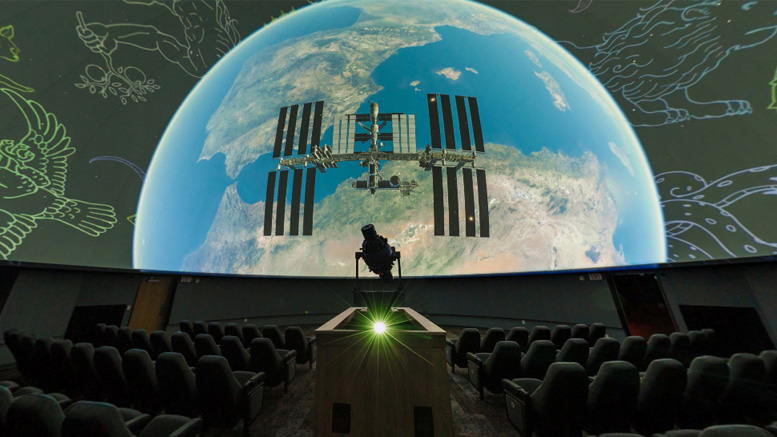By Planetarium Staff—
MUNCIE, IN—All planetarium programs are free of charge. No tickets or reservations are required for public planetarium shows.
Due to construction being done on the Cooper Science Complex, select parking and pathway access to the planetarium is blocked off. Plan to arrive early to safely navigate the area and arrive on time for the program. Visit the planetarium’s location and transportation webpage for up-to-date information.
January —Tour of the Winter Sky
Fridays: Jan. 13, 20 at 6:30pm
Saturdays: Jan. 14, 21 at 6:30pm
The sky on cold winter nights has some of the brightest stars and the best-known constellations. Some of these stars are truly supergiants hundreds of times bigger than our Sun, while others are dwarfs the size of Earth. Along the winter Milky Way there are colorful clouds where new stars are being born. Come and enjoy a guided tour of this celestial wonderland and learn how to use star charts to aid you in finding constellations and more.
Suitable for all ages 8+, all ages are welcome.
January —Saturn & Beyond
Saturdays: Jan. 14, 21 at 5:00pm
Saturn’s rings are one of the most beautiful sights in the solar system. They can be seen clearly even with a small backyard telescope. Astronomers have known about these rings for over 400 years, yet they still present many questions. In 2004 the Cassini orbiter and the Huygens probe reached Saturn. During this show we will explore the mysterious features seen by these spacecraft.
Suitable for all ages 10+, all ages are welcome.
January —One World, One Sky: Big Bird’s Adventure
Saturdays: Jan. 14, 21 at 3:30pm
“One World, One Sky” is a brilliant program that follows Sesame Street’s Big Bird and Elmo as they explore the night sky with Hu Hu Zhu, a new friend from China. Together, they take an imaginary trip from Sesame Street to the moon, where they discover how different it is from Earth. They will also find shapes in the sky that will help them find the North Star. This cross-cultural adventure opens children’s eyes to the sky, helping them see how people all over the world are connected.
Best suited for families and groups with pre-K through 1st grade learners, all ages are welcome.
February —Dynamic Earth
Fridays: Feb. 3, 10 at 6:30pm
Saturdays: Feb. 4, 11 at 6:30pm
Dynamic Earth explores the inner workings of Earth’s great life support system: the global climate. With visualizations based on satellite monitoring data and advanced supercomputer simulations, this cutting-edge production follows a trail of energy that flows from the Sun into the interlocking systems that shape our climate: the atmosphere, oceans, and the biosphere. Audiences will ride along on swirling ocean and wind currents, dive into the heart of a monster hurricane, come face-to-face with sharks and gigantic whales, and fly into roiling volcanoes.
Suitable for all ages 12+, all ages are welcome.
February —Eclipse: The Sun Revealed
Saturdays: Feb. 4, 11 at 5:00pm
There will be a total eclipse of the Sun visible from Muncie, Indiana in 2024. A total solar eclipse is such a spectacular event, it is never too early to start planning for one. Come learn how solar and lunar eclipses happen, and about scientific discoveries that have been supported by total solar eclipses. This show also uses beautiful visuals to explore the historical and cultural view of eclipses, and explains how to safely see these awe-inspiring sights.
Most suitable for ages 10+, all ages are welcome.
February —One World, One Sky: Big Bird’s Adventure
Saturdays: Feb. 4, 11 at 3:30pm
“One World, One Sky” is a brilliant program that follows Sesame Street’s Big Bird and Elmo as they explore the night sky with Hu Hu Zhu, a new friend from China. Together, they take an imaginary trip from Sesame Street to the moon, where they discover how different it is from Earth. They will also find shapes in the sky that will help them find the North Star. This cross-cultural adventure opens children’s eyes to the sky, helping them see how people all over the world are connected.
Best suited for families and groups with pre-K through 1st grade learners, all ages are welcome.
March —Birth of Planet Earth
Fridays: Feb. 24, March 3, 24 at 6:30pm
Saturdays: Feb 25, March 4, 25 at 6:30pm
How did Earth come to be a life-supporting planet? Where did our Moon come from? What does Earth’s history tell us about our chances of finding other worlds that are truly Earth-like? This show tells the twisted tale of our planet’s origins, and helps us explore the potential of other possible worlds like our own.
Suitable for all ages 10+, all ages are welcome.
March —Big Astronomy
Saturdays: Feb 25, March 4, 25 at 5:00pm
Explore world-class observatories, learn why Chile is an ideal environment for astronomy, and meet some of the diverse people who make BIG discoveries possible.
Suitable for all ages 10+, all ages are welcome.
March —To Space & Back
Saturdays: Feb 25, March 4, 25 at 3:30pm
Space exploration, our greatest adventure, impacts all of our lives here on Earth. Join us on an incredible journey from the far reaches of our known universe to then explore our own planet. Hear the extraordinary story of human ingenuity and engineering, describing how the technology that transports us through space is paving the way for the devices and apps many of us use every day.
Most suitable for all ages 10+, all ages welcome
April —Living Words
Fridays: March 31, April 14, 21 at 6:30pm
Saturdays: April 1, 15, 22 at 6:30pm
Whether earthly or alien, all life leaves a trace. Join narrator Daveed Diggs on a journey through space and time to discover how life makes Earth livable, where it could be found elsewhere in the cosmos, and what new technologies we might use to find it. Along the way, you’ll learn how light and color can help us spot other living worlds even from vast distances—and develop a new appreciation for the one-of-a-kind planet right beneath our feet.
Suitable for all ages 10+, all ages are welcome.
April —Solar Superstorms
Saturdays: April 1, 15, 22 at 5:00pm
A fury is building on the surface of the Sun… high-velocity jets, a fiery tsunami wave that reaches 100,000km high, and rising loops of electrified gas are energized by what is going on underneath its surface. Will these “storms” affect Earth? Find the answer as we venture into the seething interior of our star to learn how they are formed. Solar Superstorms takes viewers into the tangle of magnetic fields and superhot plasma that vent the Sun’s rage in dramatic flares, violent solar tornadoes, and the largest eruptions in the solar system: Coronal Mass Ejections.
Suitable for all ages 10+, all ages are welcome.
April —Kids Constellations!
Saturdays: April 1, 15, 22 at 3:30pm
Explore the patterns we can find in the night sky during this live presentation for kids.
Best suited for families and groups with kids ages 6+, all ages are welcome.
Program Information
- Runtime: Approximately 50 minutes total with live sky tour.
Planetarium Information:
- Due to construction being done on the Cooper Science Complex, select parking and pathway access to the planetarium is blocked off. Plan to arrive early to safely navigate the area and arrive on time for the program. Visit our location and transportation webpage for up-to-date information.
- Follow all COVID-19 protocols and procedures.
- No reservations are required for public planetarium shows. However, plan to arrive early as seating is done on a first-come, first-served basis and seating is limited.
- We accept cash donations at the door and greatly appreciate your support to make our programs possible.
- We do our best to have doors open 30 minutes before show time.
- Food, drinks, gum or candy are not allowed in the planetarium.
- Cellphones and any electronics that emit light must be silenced or turned off at the start of all programs. Please refrain from wearing light-up shoes to any planetarium programs.
- Children 17 years and under should be accompanied by an adult.
- The planetarium is located on the west end of the Cooper Science Complex, at 2111 W. Riverside Ave., Muncie.
For directions and parking information, as well as general policies, please visit the Charles W. Brown Planetarium website.
Interested in scheduling a private educational visit to the planetarium? Request a planetarium visit for your Ball State class or group online.



